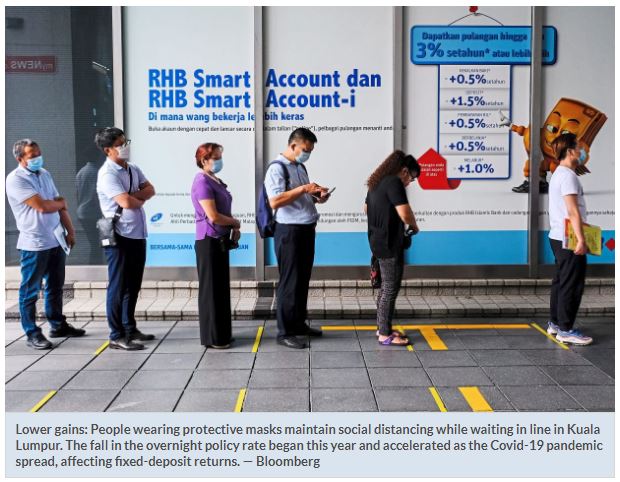Malaysia: Retirees impacted by low interest rates
THE low interest rate environment has made it more difficult to find risk-free returns, making the life of retirees who put their savings into fixed-deposit (FD) instruments for returns more difficult.
While interest rates have been on a falling trend globally, especially in the more developed economies, the trend seems to have caught on in Malaysia.
“I can find that some banks still do offer up to 2.25% per annum for a longer tenure of placement, ” said a retiree.
Another retiree said that Malaysia once had an advantage with its higher FD rates compared to the more advanced economies such as Singapore, which explained why people had preferred to spend their golden years in Malaysia.
But it would appear that this advantage is now diminishing with the rapid pace of interest rate cuts that have happened this year.
The fall in the overnight policy rate (OPR) began this year and accelerated as the Covid-19 pandemic spread.
The drop in interest rates is significant. It was only at this time one year ago that the OPR stood at 3%.
The OPR then was cut several times as the year 2020 began, with the first cut happening in late January – a cut to 2.75%.
The OPR is now at 1.75% (almost halve from what it was a year ago) and economists are already expecting another 25-basis-point reduction in September.
Socio-Economic Research Centre’s executive director Lee Heng Guie (pic below) told StarBiz that retirees who have been relying on FD returns would face the dilemma of searching for higher yields now.
“Against conventional advice, some may have put their savings into the share market.
“It’s better to search for fundamentally sound dividend-yielding stocks, but it’s not a risk-free investment instrument, ” Lee said.
Notably, equity valuations are elevated now and any abrupt change or a surge in volatility could see these savings being affected or being totally wiped out.
“Retirees need to be cautious when chasing for returns, as they need to protect their life savings as well, ” Lee said.
For others, they may have a more diversified passive income stream such as from investment properties as they rent out their properties to pay for expenses.
Lee said that there may be some who could sell their houses and buy a smaller place since there was no need for such a big space anymore.
“For some, their kids are not living with them anymore so they may see no need to have such a big house.
“So what they do is monetise the gains by selling the house and using the gains to support themselves, ” he said.
The government recently announced the issuance of a sukuk called Sukuk Prihatin, a syariah-compliant investment instrument.
The sukuk can be subscribed to with a minimum of RM500 at a profit rate of 2% per annum for two years.
Lee said that on the fact that the government is issuing these bonds at a 2% rate and being government-guaranteed was a signal that interest rates could stay at these levels for at least the next two years.
“This can be a good instrument also that can be considered if people are searching for higher yields.
“But in such times, one may need to draw down on their savings pool too, ” he said.
He said pensioners would be less affected as they would have a steady and predictable monthly income from their pension.
Source: https://www.thestar.com.my/business/business-news/2020/08/31/retirees-impacted-by-low-interest-rates


 English
English





